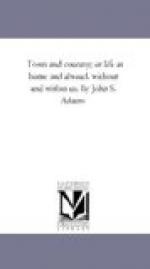After some talk, the stranger agreed to call the next day. The next day came, and with it came the stranger. Mr. Short had tried in vain to obtain the requisite sum, and was obliged to request him to call the next day. He came the next day, and the next, and the next, but received no money; and he was at length obliged to attach the property of the squire, as also that of Mr. Short. His other creditors also came in with their bills. All the stock of Mr. Short was sold at auction, and he was a poor man. He obtained a small house, that would not compare with the one he had lived in in former years. He had no money of his own, and was still deeply in debt. He was obliged to work at such jobs as came along, but at length obtained steady employment. The squire, who was the prime cause of all his trouble, sailed for a foreign port, leaving all his bills unpaid, In a short time Mr. Short obtained a sufficient sum to buy back his old shop, in which to this day he has steadily worked, with a vivid remembrance of the consequence of speculation.
RETROSPECTION.
He had drank deep and long
from out
The
bacchanalian’s bowl;
Had felt its poisonous arrows
pierce
The
recess of his soul;
And now his footsteps turned
to where
His
childhood’s days were cast,
And sat him ’neath an
old oak tree
To
muse upon the past.
Beneath its shade he oft had
sat
In
days when he was young;
Ere sorrow, like that old
oak tree,
Its
own deep shadows flung;
Beneath that tree his school-mates
met,
There
joined in festive mirth,
And not a place seemed half
so dear
To
him, upon the earth.
The sun had passed the horizon,
Yet
left a golden light
Along a cloudless sky to mark
A
pathway for the night;
The moon was rising silently
To
reign a queen on high,
To marshal all the starry
host,
In
heaven’s blue canopy.
In sight the schoolhouse stood,
to which
In
youth he had been led
By one who now rests quietly
Upon
earth’s silent bed.
And near it stood the church
whose aisles
His
youthful feet had trod;
Where his young mind first
treasured in
The
promises of God.
There troops of happy children
ran
With
gayety along;
’T was agony for him
to hear
Their
laughter and their song.
For thoughts of youthful days
came up
And
crowded on his brain,
Till, crushed with woe unutterable,
It
sank beneath its pain.
Pain! not such as sickness
brings,
For
that can be allayed,
But pain from which a mortal
shrinks
Heart-stricken
and dismayed:
The body crushed beneath its
woe
May
some deliverance find,




